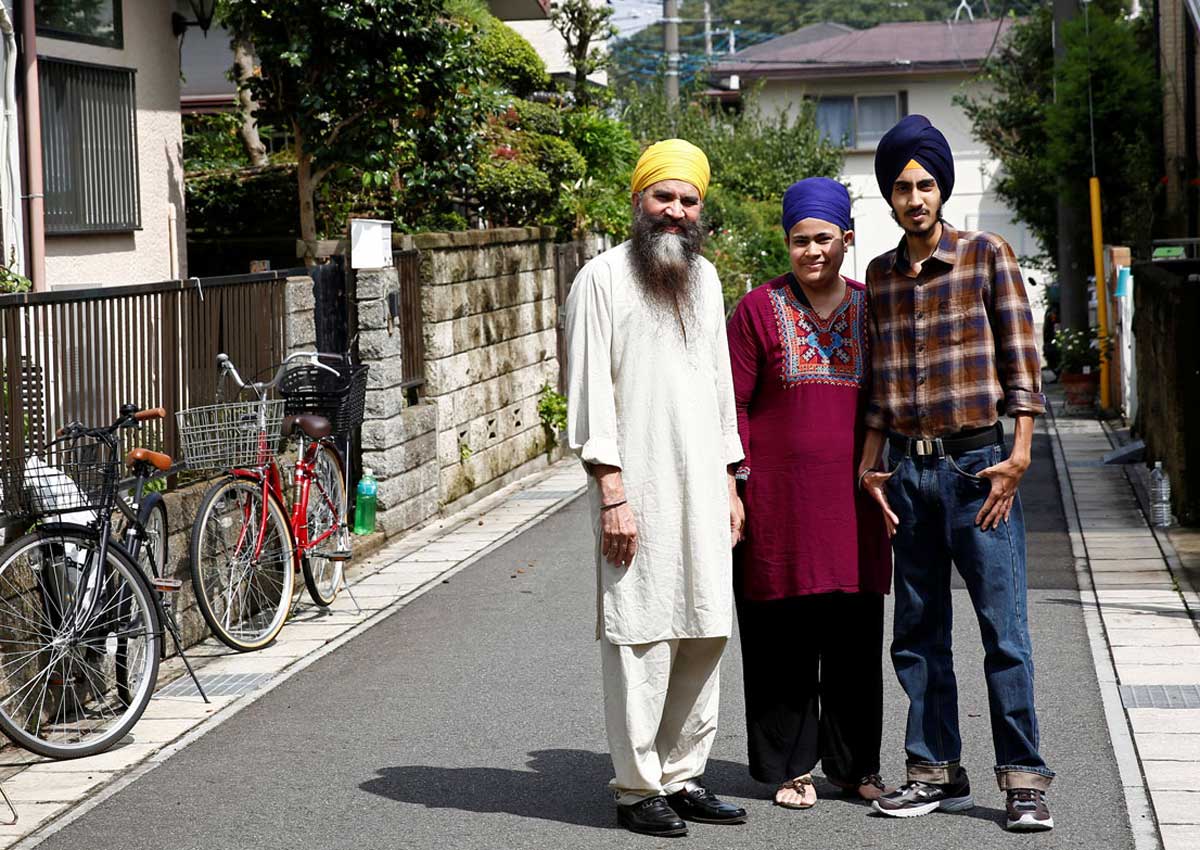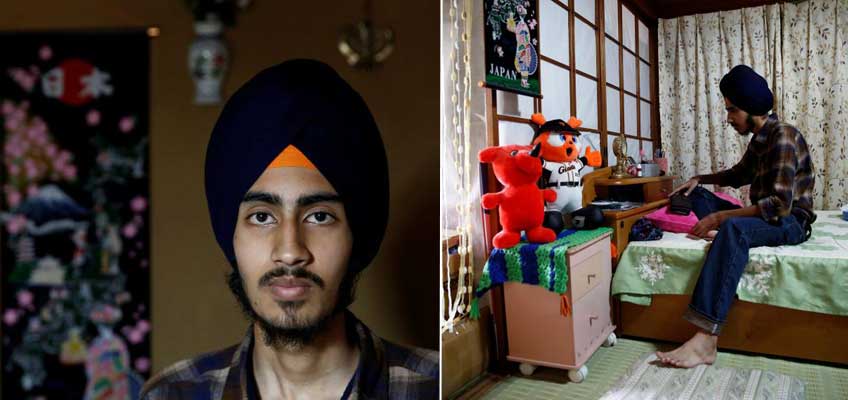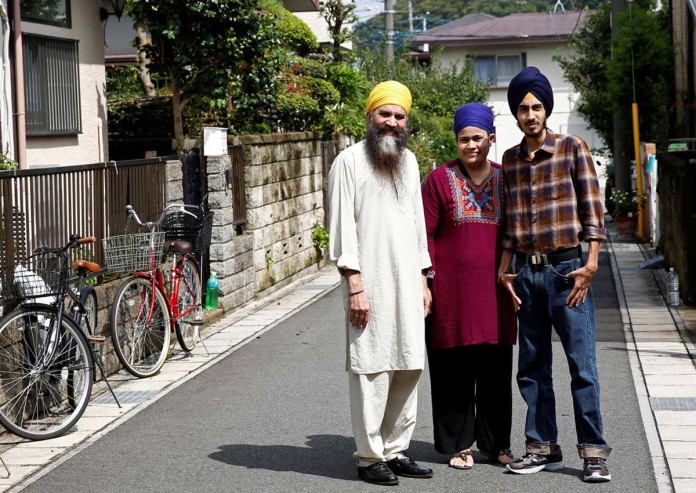Every other Sunday, 17-year-old Gursewak Singh plays the tabla drums at the Sikh temple located in the basement of a Tokyo building where his father leads the local community in prayers.
He dreams of going to college and working in Japan – the only country he’s ever known – but he doesn’t know if the authorities will let him.
Gursewak was born and raised in Matsudo, Chiba Prefecture, a quiet suburban town east of Tokyo.
“I went to a government-run kindergarten, elementary school, middle school and high school all in Chiba prefecture. My life’s been no different to the life of Japanese people,” said Gursewak, who speaks the language with native fluency and considers himself Japanese.
However, he has inherited the legal limbo status of his Sikh parents who fled to Japan from India to escape religious oppression before he and his siblings were born.
The Japanese government, however, has repeatedly denied them asylum and wants them deported. The system of “provisional release”, which allows applicants to stay in Japan while their asylum case is being reviewed, has kept them in the country until now.
But this status also means they can’t work, they don’t have health insurance and they need permission to travel outside the prefecture where they live. They are also subject to unannounced inspections by immigration officers at their home and they face detention at any time. There are currently some 4,700 people with this status living in Japan.
Gursewak’s whole family has been living off donations from a Sikh charity and Sikhs in the local community.
Now the clock is ticking on his very future as he grows up.
“The most difficult thing now is not being able to work. I want to go to college next year, but without work, I can’t see my future at all,” Gursewak said.
“The immigration authorities tell us to go back to our parents’ home country. But I’ve never been to India. It’s not like going back to your hometown in the countryside. The immigration authorities must be kidding themselves,” Singh said, adding he has no intention of leaving Japan.
His case highlights the plight of hundreds of other children in Japan who have inherited similar legal issues.
Gursewak’s father, Bharpoor, fled his Punjab hometown of Sakruli in 1992 after he said he was arrested by Indian police and tortured for being a Sikh religious leader, according to Japanese court documents of his testimonies.
Last year, immigration officials made his parents an offer: Leave Japan, and your children can stay. The offer was refused.
However, immigration officials say that they never initiate such offers but they are open to the idea if it is first broached by the family. They said they didn’t know how many cases there had been in which parents agreed to separate from their children in the hope of giving them a better life in Japan.
When Gursewak was 10 years old, his father was detained for ten months and he suddenly became much more conscious of his limbo status. He began calling lawyers and NGOs for advice, and collecting signatures from Japanese neighbours to support his family’s petition for visas.
He also started writing the first of dozens of letters to the Justice Ministry then, pleading that his family gain legal status in Japan.
The letters, all written in Japanese, have become more eloquent as Gursewak grows older. But the message is unchanged – a plea to the Japanese authorities to recognise him and his family as residents in a country where he and his younger twin siblings were born and his parents, natives of India, have lived since the 1990s.
He has not received a single reply.
The head of Provisional Release Association in Japan, Mitsuru Miyasako, believes that Japan’s strong sense of homogeneity has made access to legal status extremely difficult especially for some asylum seekers.
Government data shows more than 500 children share Gursewak’s predicament of living in perpetual uncertainty.
They can go to government-run schools, where tuition is largely free, but university is out of reach for most because they and their parents aren’t allowed to work and so can’t afford the fees. These children, many of whom are asylum seekers, will soon face a stark choice between forced unemployment and working illegally.
“These children, high school students without residency permits, their situation stems from the problems which Japan’s immigration authorities have tried to ignore in the past but have gradually come to the surface,” Miyasako said.
Now immigration officials are trying to clamp down on visa overstayers, people working without permits and asylum seekers who fail to abide by the rules of their ‘provisional release’. An internal Justice Ministry memo from September last year called for closer surveillance of those on provisional release.
For Gursewak and the other children sharing his plight, this has cast a dark cloud over their futures.
“These kids worry about what their efforts would amount to in the future-the studying, the money that their parents struggled to gather to send them to college. After four years of college, then what? Would they have just left their parents with a huge amount of debt? Would their efforts be rewarded? These are questions these kids ask themselves, and all they see is darkness in front of them,” Miyasako said.
Japanese authorities say the fact that these children were born or raised in Japan is not an argument for leniency. Japan generally recognises only the right of blood, or jus sanguinis, for citizenship.
The experience of Gursewak and other children born to migrant parents exposes Japan’s deep reluctance to accept foreigners, even as the country’s population ages and its workforce shrinks.
Last year Japan accepted only 27 refugees. At the end of 2015, 14,000 applicants were under review.
Belgium, with a population of less than a tenth the size of Japan’s, had a similar number of asylum applications, but had approved almost two thirds by the end of June.
While Singh is not barred from attending university, his family cannot afford the fees because they can’t work. Average annual tuition for government-run universities in Japan is around US$5,000 (RM22,000), plus a one-off entrance fee of about US$3,600 (RM16,000). The family’s monthly expenses are about US$1,800 (RM8,000).
Singh, who will start his final year of high school in April in 2017, wants to study web design, but he is not sure how he or his parents would be able to facilitate his dream of going to university.







